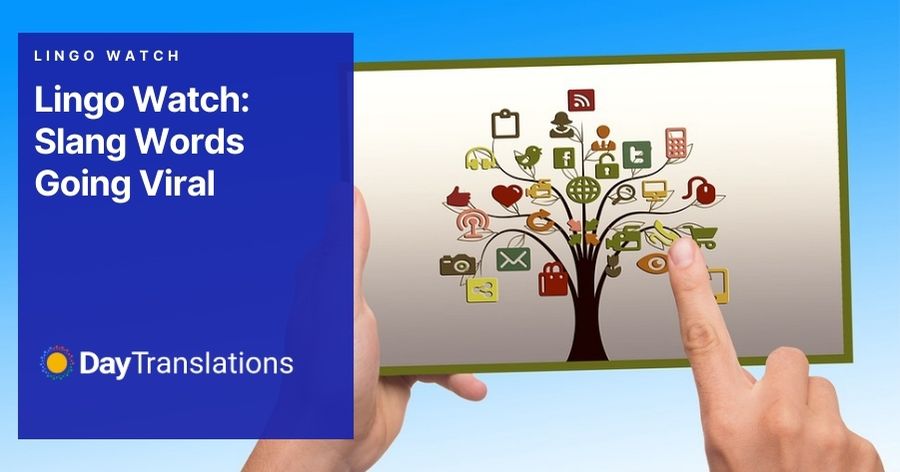We hereby present to you Lingo Watch – our new blog series, in which we’ll be discussing the emerging slang words. Some of the lexemes and idioms we’ll be talking about in the time ahead have been with us for a long time, but they’ve become viral words for some reason. Some other current slang words will be neologisms or not even entire words. We all know how Zoomers like to clip the existing words and give them some new connotations. So, we’re eager to dive into the Gen Z slang and debunk as many new slang words as possible.
Slang Words Explained
Slang words are lexemes that have a different connotation from their literal meaning. For instance, if you say that the weather is cool, it means that it’s pretty cold. But if you call a person cool, it refers to their calm, confident, and often attractive character or looks. So, the meaning of slang is not literal or transparent, but is rather a matter of creative and metaphorical interpretation.
Slang is often associated with a certain social group and their relationships. Let’s stay with the cool for a few seconds more; for instance, the current slang for cool is lit or gas. So, if Keanu Reeves was cool 30 years ago, Jacob Elordi is lit today. (And Keanu Reeves is still both cool and lit).
When it comes to the appropriate use of new slang, old slang, or any colloquialism whatsoever, it’s important to know that such expressions shouldn’t be used in formal language.
Popular Slang Words
Now that we know what slang is and when (not to) use it, let’s learn some of the most popular slang words this year so far.
GOAT – typically used by sports journalists and fans, this slang acronym stands for the ‘Greatest Of All Time’. The most heated discussion this year has probably been about the GOAT male player in tennis.
GRWM – meaning ‘Get Ready With Me’, this is an acronym describing a video blog – vlog – in which the author shoots their routines throughout the day. For instance, “I’m about to prepare my breakfast – GRWM!”
Extra – this adjective denotes a too intense reaction to a situation that’s not so dramatic. For instance, if your friend panickly tells you they’ve lost their Internet connection, you can respond: “No need for such an extra attitude. People have bigger problems.”
Mid – an adjective used to describe something of medium quality. For instance, food that doesn’t impress you can be described as ‘mid’.
‘Spill the Tea’ or just ‘Tea’ – this expression translates as something secretive or simply to gossip. When you want your colleague to tell you something intriguing from the office, you can say: “Come on, spill the tea.”
IYKYK – another from the batch of current slang terms generated in chat communication, ‘If You Know, You Know’ is an acronym denoting that only a few people can understand a reference. For example: “The late David Lynch can thank Angelo Badalamenti for his scores – IYKYK!”
No cap – those who want to stay up to date with new slang will use ‘no cap’ when they want to highlight they’re completely frank or sincere. For example: ‘No cap, the dinner was a bit mid.’
Bussin’ – this adjective is used when you want to say that something is extraordinarily good. You’ve just had the best shrimps you’ve ever tasted: “The shrimps are bussin’!”
Vibe check – a new slang expression used when someone wants to find out if people are having fun at a hangout or party. The party host can shout out loud: “Vibe check, guys! Everybody lit?”
Bet – if someone wants to use a current slang expression when confirming something or saying they understand it well, they can use the adverb ‘bet’. If a friend asks you whether you’re coming to their party, you can just say: “Bet!”
We need to be aware that slang words are constantly changing. If a new TV show becomes viral in, say, October, we can expect some new viral words to become popular with the fans of this particular series by the end of the year. Also, an influencer or a YouTuber may start using a new slang word and popularise it among their young audience. That’s how Kai Cenat made the word rizz viral, having created hype over this synonym for charisma. So, the words above may not be the most popular slang words in a few months.
New Slang: Growing as We Speak
Current slang words are usually created on the spur of the moment. What’s more, they often don’t last for too long, especially when it comes to Gen Z slang. The exchange of ideas and different cultural backgrounds on social media and the Internet in general only adds to this diversity of linguistic neologisms. So, these are exciting times for linguistics aficionados – you can never tell when a new word will be coined or when an old term will turn into new slang. How cool is that?












Sorry, the comment form is closed at this time.